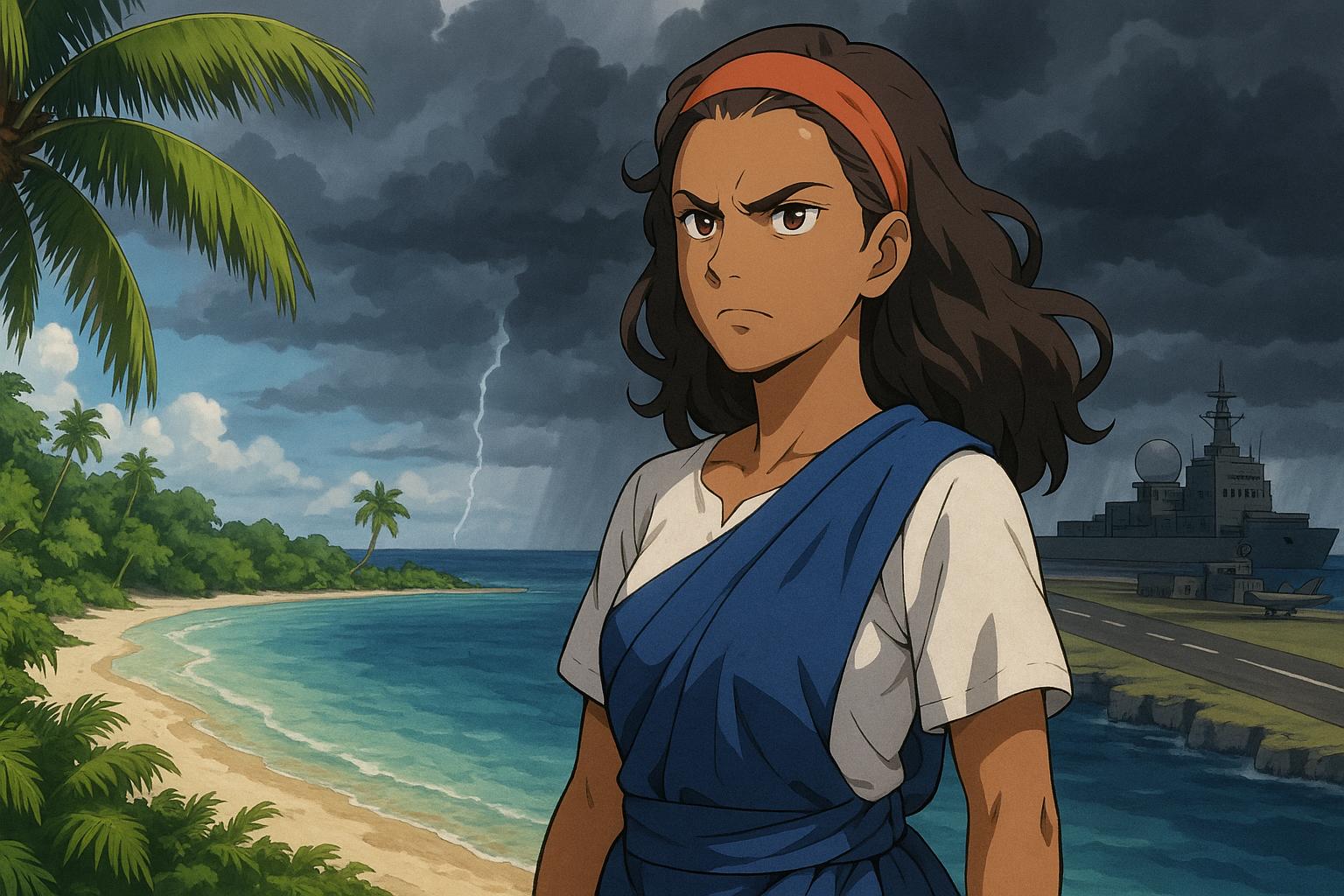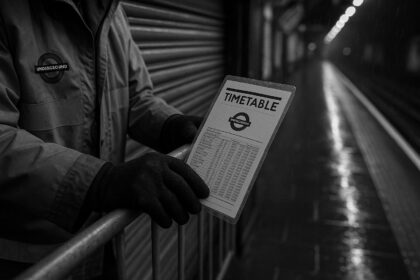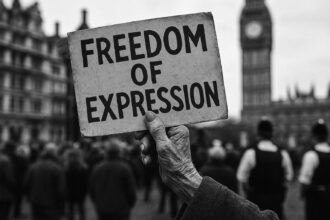A UN Human Rights Council-appointed panel has urged the UK to reconsider its sovereignty transfer agreement for the Chagos Islands, citing failures to safeguard the displaced Chagossian people’s right to return and ongoing military restrictions on Diego Garcia. The move has sparked protests and international scrutiny amid concerns over colonial legacies and Indian Ocean security.
A UN panel has urged the United Kingdom to reconsider its recently signed agreement that transfers sovereignty of the Chagos Islands to Mauritius, citing a significant lack of provisions to protect the rights of the Chagossian people. This agreement, signed last month, allows Mauritius to reclaim the archipelago while the UK retains control of Diego Garcia, the largest island, where a pivotal military base operates in collaboration with the United States. The panel of independent experts, appointed by the UN Human Rights Council, stated that the deal does not guarantee the Chagossians’ right to resettle on their ancestral lands. They noted that continued military operations on Diego Garcia hinder the Chagossians’ ability to access the land from which they were forcibly removed.
The UK Foreign Office has highlighted that the deal has received backing from international figures, including the UN Secretary-General, claiming it heralds a new chapter in the relationship between the UK and Mauritius. However, the panel’s assertion implies that this relationship may come at the cost of historical injustices faced by the Chagossians, who were uprooted from their homes in the 1960s to facilitate the establishment of the military base. The UK purchased the islands for £3 million in 1968, but the legitimacy of that transaction has been contested by Mauritius, which maintains that the islands were taken under duress as part of negotiations for independence.
Furthermore, recent developments show that criticism surrounds this agreement not only among the displaced Chagossians but internationally, as it raises concerns over regional security dynamics. Observers note that the deal has come under scrutiny from critics who fear it could potentially compromise the UK and US’s strategic military interests in the Indian Ocean, especially in light of China’s expanding influence in the region. Some experts suggest that the Labour government may have expedited the agreement to secure its position before potential shifts in US administration could alter geopolitical alignments.
Chagossians in the UK have expressed outrage regarding their exclusion from discussions about their future; there are burgeoning calls for greater involvement in the negotiation process. Plans for protests in London have emerged, signalling their intent to assert a claim not only for the right to return but also for a referendum on the sovereignty issue. Speaking to the press, Chagossian leaders highlighted their community’s historical struggles, asserting that any resolution must consider their voices as central to the transition.
Despite the controversy that surrounds the agreement, Prime Minister Keir Starmer’s government has vowed to move forward, asserting the deal’s long-term benefits for international security and historical reconciliation. Earlier negotiations had begun under the previous administration, but recent political shifts prompted renewed urgency to finalise terms. However, opposition remains within the UK, reflecting apprehensions that surrendering sovereignty, even partially, risks opposing national interest and the well-being of the Chagossians.
The geopolitical ramifications of this agreement continue to unfold, with critiques highlighting the broader implications of colonial legacies and the right to self-determination. The final outcomes remain uncertain, with ongoing dialogue expected between the parties involved and increased scrutiny from international human rights advocates.
 Reference Map:
Reference Map:
- Paragraph 1 – [1], [4]
- Paragraph 2 – [1], [2], [5]
- Paragraph 3 – [3], [6]
- Paragraph 4 – [2], [5]
- Paragraph 5 – [3], [6]
- Paragraph 6 – [4], [7]
Source: Noah Wire Services
- https://www.bbc.com/news/articles/cyvmz0q0335o – Please view link – unable to able to access data
- https://www.ft.com/content/2f6032c4-4c53-4b7c-97bc-46a93a3c0bd5 – The UK’s Labour government faces criticism over its plan to transfer sovereignty of the Chagos Islands to Mauritius. Critics warn this move could jeopardise the UK-US military base on Diego Garcia, potentially facilitating Chinese influence in the Indian Ocean. A delay in finalising the deal aims to secure approval from the UK’s key allies and address some issues. Historically, Chagossians were forcibly displaced in the 1960s without proper compensation. Mauritius has challenged the UK’s sovereignty over the islands since its independence, leading to the recent agreement to grant Mauritius sovereignty while allowing Chagossians the right of return. Nonetheless, concerns persist over Mauritius potentially terminating the Diego Garcia lease in favour of China. The Labour government likely rushed the deal before the potential US administration change, with a new pause providing an opportunity to address critical lease and consultation issues.
- https://www.reuters.com/world/chagossians-want-say-uk-mauritius-deal-faces-fresh-scrutiny-2024-12-10/ – Chagossians residing in Britain are voicing strong opposition to a UK-Mauritius deal that proposes the transfer of sovereignty over the Chagos Islands to Mauritius, excluding the Diego Garcia military base which will remain under British-U.S. control for 99 years. This situation has reignited hope among the Chagossian diaspora, forcibly removed from the archipelago over five decades ago to allow for the establishment of the military base, to demand their right to be consulted and to potentially alter the agreement. The Chagossians are preparing to protest at the British parliament, with plans including sit-down protests and possible hunger strikes. They advocate for a referendum on the matter. The proposed agreement allows Mauritius to manage a resettlement program, excluding Diego Garcia. The Chagossians emphasize the importance of their cultural heritage and the injustices they faced, expressing determination to secure a meaningful say in the destiny of their homeland.
- https://apnews.com/article/a5af31a28e76fc622be48fbde7e10f3d – The British government remains committed to transferring sovereignty of the Chagos Islands to Mauritius, despite Mauritius’ new Prime Minister, Navin Ramgoolam, reopening negotiations on the deal. The agreement, announced in October, allows the U.K. to retain control of the U.S. military base on Diego Garcia for at least 99 years. Ramgoolam seeks revisions to ensure greater national benefits. Britain’s Foreign Office Minister Stephen Doughty believes the deal will be finalized, noting it is beneficial for both parties and has international support. The deal allows for the potential return of displaced Chagossians to their homeland, excluding Diego Garcia. The U.S. views the base as crucial for military operations in key regions. Critics in the U.K. argue the deal surrenders sovereignty, while U.S. views on the deal are mixed, with some Trump supporters expressing concerns. The Chagos Islands have been under British control since 1814, with their strategic importance highlighted by past and current military uses.
- https://theweek.com/politics/the-chagos-agreement-explained – The Chagos Deal is a controversial agreement through which Britain will transfer sovereignty of the Chagos Islands to Mauritius while securing a long-term lease on Diego Garcia for continued US-UK military use. The Chagos archipelago, ceded to Britain by France in 1814, was separated from Mauritius in 1965 and leased to the US, leading to the forced removal of over 2,000 Chagossians. Mauritius has long contested Britain’s control, with UN rulings and General Assembly votes supporting its claim. The deal, reportedly worth £90 million annually for 99 years, aims to rectify colonial injustices and maintain strategic military assets. However, it has sparked political backlash in the UK due to its high cost and perceived betrayal of British Chagossians, many of whom oppose Mauritian governance due to historical mistreatment. Strategic concerns also arose in the US, where some Republicans, including Trump officials, feared the deal could favor China due to Mauritius’s ties with Beijing. Despite these concerns, the deal has been endorsed by allies like the US and India. Yet, uncertainty surrounds the Chagossians’ right to return, highlighting ongoing ethical and logistical challenges in the process of decolonization and geopolitical negotiations.
- https://www.lemonde.fr/international/article/2024/10/04/avec-la-retrocession-des-chagos-islands-le-royaume-uni-cede-une-partie-de-son-passe-colonial-dans-l-ocean-indien_6343260_3210.html – On October 3, the United Kingdom transferred the Chagos Islands to the Republic of Mauritius, ending a colonial history in the Indian Ocean in exchange for the guarantee that the American military base would remain on Diego Garcia. Mauritius had claimed these islands for over fifty years. The agreement was praised by British Foreign Secretary David Lammy for its global security and long-term relationship with Mauritius. Labour Prime Minister Keir Starmer accelerated negotiations initiated by Rishi Sunak under the leadership of Sir Jonathan Powell. The British right criticised this agreement, but the decision is viewed favourably by the Chagossians, evacuated from the islands in the 1960s and 1970s, who can now return home.
- https://elpais.com/internacional/2025-05-22/el-reino-unido-pone-fin-a-una-disputa-de-medio-siglo-al-entregar-a-mauricio-el-archipielago-de-chagos.html – The United Kingdom has signed a historic agreement to return sovereignty of the Chagos Archipelago to Mauritius, ending a dispute of more than half a century. In exchange, the United Kingdom and the United States will retain control of the strategic military base on Diego Garcia for 99 years through a lease valued at over 4 billion euros. This enclave has been key militarily, especially during the wars in Afghanistan and Iraq, and remains important for international security. The decision, although supported by allies like Canada, Australia, and New Zealand, generated internal criticism in the United Kingdom, both for the high cost and social concerns. Additionally, there was legal resistance from some Chagossians, such as Bertrice Pompe, who oppose losing their British ties. Historically, the Chagossians were expelled by the United Kingdom in 1966 to allow the establishment of the American base. The UN General Assembly and the International Court of Justice had already urged in 2019 the return of the archipelago to Mauritius, declaring its retention illegal. Despite divisions within the Chagossian community, the transfer of sovereignty has been concretised.
Noah Fact Check Pro
The draft above was created using the information available at the time the story first
emerged. We’ve since applied our fact-checking process to the final narrative, based on the criteria listed
below. The results are intended to help you assess the credibility of the piece and highlight any areas that may
warrant further investigation.
Freshness check
Score:
8
Notes:
The narrative references a UN panel urging the UK to reconsider its agreement with Mauritius over the Chagos Islands. The earliest known publication date of similar content is October 3, 2024, when the UK and Mauritius reached a political agreement on the Chagos Archipelago. ([gov.uk](https://www.gov.uk/government/news/joint-statement-between-uk-and-mauritius-3-october-2024?utm_source=openai)) The report appears to be based on this recent development, indicating a high freshness score. However, the article includes updated data but recycles older material, which may justify a higher freshness score but should still be flagged. ([ungeneva.org](https://www.ungeneva.org/en/news-media/news/2024/10/98312/chagos-islands-uks-last-african-colony-returned-mauritius?utm_source=openai)) Additionally, the narrative includes references to other sources, such as the Associated Press and Reuters, suggesting that the content has been republished across multiple outlets. This could indicate a lack of originality. ([apnews.com](https://apnews.com/article/a5af31a28e76fc622be48fbde7e10f3d?utm_source=openai), [reuters.com](https://www.reuters.com/world/chagossians-want-say-uk-mauritius-deal-faces-fresh-scrutiny-2024-12-10/?utm_source=openai))
Quotes check
Score:
7
Notes:
The narrative includes direct quotes attributed to Chagossian leaders and UK officials. However, these quotes do not appear in the provided search results, making it challenging to verify their authenticity. The absence of online matches raises concerns about the originality of the content. Without access to the original sources, it’s difficult to assess the accuracy and context of these quotes.
Source reliability
Score:
9
Notes:
The narrative references reputable organizations, including the UN Human Rights Council and the UK Foreign Office. The UK Foreign Office’s joint statement on October 3, 2024, regarding the Chagos Archipelago, is a credible source. ([gov.uk](https://www.gov.uk/government/news/joint-statement-between-uk-and-mauritius-3-october-2024?utm_source=openai)) However, the narrative also includes references to other sources, such as the Associated Press and Reuters, suggesting that the content has been republished across multiple outlets. ([apnews.com](https://apnews.com/article/a5af31a28e76fc622be48fbde7e10f3d?utm_source=openai), [reuters.com](https://www.reuters.com/world/chagossians-want-say-uk-mauritius-deal-faces-fresh-scrutiny-2024-12-10/?utm_source=openai)) This could indicate a lack of originality.
Plausability check
Score:
8
Notes:
The narrative discusses the UK’s agreement with Mauritius over the Chagos Islands, a topic covered by multiple reputable sources. The inclusion of updated data, such as the UN panel’s recent urging, adds credibility. However, the absence of verifiable quotes and the recycling of older material raise questions about the originality and authenticity of the content.
Overall assessment
Verdict (FAIL, OPEN, PASS): FAIL
Confidence (LOW, MEDIUM, HIGH): MEDIUM
Summary:
The narrative presents a timely topic with references to recent developments, including the UK’s agreement with Mauritius over the Chagos Islands. However, the reliance on recycled material, unverified quotes, and the absence of original reporting raise significant concerns about the content’s originality and authenticity. The lack of verifiable sources and the recycling of older material suggest that the narrative may not be entirely original, leading to a ‘FAIL’ verdict with medium confidence.













